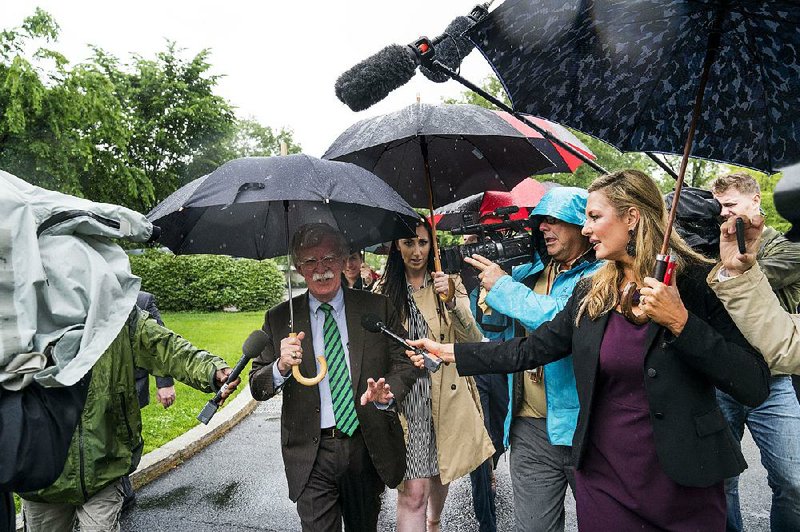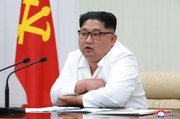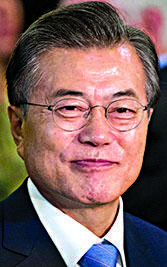WASHINGTON -- President Donald Trump on Thursday reassured North Korean leader Kim Jong Un that he would remain in power under any nuclear deal reached with the United States, emphasizing that his administration is not seeking regime change after Pyongyang threatened to cancel the leaders' summit.
In impromptu remarks at the White House, Trump contradicted national security adviser John Bolton, who had said the administration would ask North Korea to emulate the "Libya model" from 2003 in which the Moammar Gadhafi regime relinquished its nascent nuclear weapons program.
A top Kim aide this week blasted Bolton for the comment, blaming the Libya deal for Gadhafi's 2011 downfall.
"The Libya model isn't the model that we have at all when we're thinking of North Korea," Trump said. "In Libya, we decimated that country. That country was decimated."
He stressed that he is "willing to do a lot" to provide security guarantees to Kim. "The best thing he could do is make a deal."
A deal with North Korea, Trump said, "would be with Kim Jong Un, something where he'd be there, he'd be in his country, he'd be running his country, his country would be very rich, his country would be very industrious."
Past administrations, including under Presidents Barack Obama and George W. Bush, also have had a policy that does not call for regime change in North Korea. Secretary of State Mike Pompeo, who has met with Kim twice in Pyongyang over the past two months, has reportedly told Kim directly that the United States is not seeking his removal from power.
But Trump's comments provided a public guarantee that appeared aimed at trying to ensure the North Koreans would not back out of the summit, which is scheduled for June 12 in Singapore.
Trump said Thursday that his administration is continuing to negotiate with Pyongyang over the specific site to be used for the meeting in Singapore.
The two sides "are continuing to negotiate in terms of location, the location as to where to meet, how to meet, rooms, everything else.
"They've been negotiating like nothing happened," he said, referring to the doubt the North cast on the meetings.
Bolton said in recent weeks that the Libya model would require North Korea to fully abandon its nuclear program before the U.S. would offer reciprocal benefits, such as easing economic sanctions.
But Trump suggested Bolton was referring to what would happen if Pyongyang did not make a deal.
"The best thing he could do is to make a deal," Trump said of Kim.
The Libya model, where the country was "decimated," is "what will take place if we don't make a deal," the president said. "If we make a deal, I believe Kim Jong Un would be very, very happy."
White House aides meanwhile denied that Kim is in the driver's seat. Press secretary Sarah Huckabee Sanders emphasized that it was Kim who extended an invitation to Trump for a meeting, which the president accepted in March.
Trump noted that Kim has met twice with Chinese President Xi Jinping and that the Chinese could have encouraged North Korea's actions Wednesday, when Pyongyang abruptly called off planned talks with South Korean officials, objecting to routine joint military exercises between South Korea and the United States.
[NUCLEAR NORTH KOREA: Maps, data on country’s nuclear program]
Today, South Korea's Unification Ministry spokesman said it believes the North remains committed to improving relations.
Baek Tae-hyun said Seoul expects Pyongyang to faithfully abide by the agreements reached between Kim and South Korean President Moon Jae-in in their summit last month. The Korean leaders had issued a vague vow on the "complete denuclearization" of the peninsula and pledged permanent peace.
"We are just at the starting point, and we will not stop or waver as we move forward for peace in the Korean Peninsula," Baek said.
Referring to the joint drills with South Korea, Pentagon spokesman Dana White said Thursday that the schedule of military exercises hasn't changed.
She added that the annual drills are long-planned, defensive in nature and meant to ensure the readiness of the forces of the two allies.
S. Korean on spot
The latest pushback from North Korea has dealt a blow to the foreign policy agenda of South Korea's president, Moon Jae-in, whose approval ratings at home have soared since his country arranged the meeting between Kim and Trump.
But for Moon, the North's change in tune brought home the difficulties in playing matchmaker between the South's most fearsome foe and its most important ally, two countries run by often unpredictable leaders.
Moon faces skepticism from both Pyongyang and Washington that he can be an honest broker. North Korea still considers South Korea a U.S. stooge. In the United States, conservatives who have the president's ear worry that progressive South Korean leaders like Moon will ease sanctions, breaking ranks with Washington in their eagerness to reconcile with the North.
"A matchmaker can succeed when boy and girl like each other," said Moon Seong-mook, a senior analyst at the Korea Research Institute for National Strategy in Seoul. "But the United States and North Korea have very different ideas on how to achieve denuclearization."
It remains unclear if the North's sudden shift in attitude signals a return to brinkmanship or mere posturing before the June 12 summit.
Kim told visiting South Korean officials in March that he "understands" the drills would take place and expressed hope that they'll be modified once the situation on the peninsula stabilizes, according to the South Korean government.
But on Thursday, Pyongyang called Moon's government "impudent" and "shameless" for asking for inter-Korean talks while it continued the military exercises.
"It won't be easy to sit down again with the current government of the South until it resolves the grave situation," Ri Son Gwon, a senior North Korean negotiator, told the North's official Korean Central News Agency.
While most South Koreans support Moon's role as an intermediary, North Korea's actions on Wednesday give political ammunition to his conservative enemies, who call him a naive amateur who has fallen for Pyongyang's trap of "false peace." They fear Moon will not denuclearize the North and will weaken Seoul's alliance with Washington.
North Korea's reversal has already dampened some of the optimism that pervaded South Korea after Moon's April 27 meeting with Kim on the inter-Korean border. His party had been hoping to benefit politically from the Singapore meeting, which would take place a day before elections of mayors and provincial governors in South Korea. Moon's North Korea diplomacy has loomed large over the contests.
Moon's government vowed Thursday to "step up a mediator's role," urging North Korea and the United States to "respect each other" and "think in the other's shoes" despite occasional setbacks.
"The situation we have is part of the long and hard process of creating the same painting," said Moon's spokesman, Yoon Young-chan.
Information for this article was contributed by David Nakamura and Philip Rucker of The Washington Post; by Lolita C. Baldor, Zeke Miller, Ken Thomas, Kim Tong-Hyung, Catherine Lucey and Matthew Lee of The Associated Press; and by Choe Sang-Hun of The New York Times.
A Section on 05/18/2018



